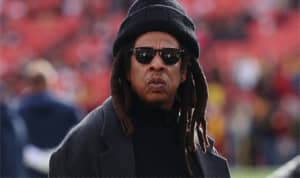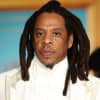In the weeks since the release of JAY-Z's 4:44 album, TIDAL has slowly released a series of video features for each track containing interviews on the album's themes. They star JAY-Z and a cast of extremely well-known faces, including Will Smith, Michael B. Jordan, Kendrick Lamar, Anthony Anderson, and many more. These intimate mini-docs were directed by comedian and writer Neal Brennan who is known for being the co-creator of Chappelle's Show, writing 1998's Half Baked, and his own standup career.
In an interview with The FADER, Brennan spoke about being the behind the camera, what he hopes others will gleam from these icons sharing their feelings, and why the documentary features only men.
What were the initial talks about this video series like?
I've wanted to make a cinematic documentary in this area and somehow they knew that and it snowballed into this. Then I listened to the record with Jay — not by ourselves, but me and Jay and four other people and I asked him questions about the records. That was cool, just as a fan of it, and then it was deciding what kind of questions would you ask about these themes and deciding what kind of people I'd want to interview. They were either friends with me or friends with Jay — all of my people he could've gotten without me [laughs]. It's not like Michael Che is going to be like, "No, no thank you, JAY-Z."
It was kinda cool to see the world of comedy meeting a lot of musicians. Did you share any thoughts about that with Jay?
I think it was more just like who are some smart black dudes we can talk to and I had my list and he had his list. I think in the last five years we've realized that comedy has a huge cultural force. I mean, it's always been huge, but I think people realize it now. I think Chris Rock and JAY-Z are the two most quotable black dudes in the last 30 years, or 20 years at least. And that's across all races and genders. Comedians are smart, when people say, "So-and-so seems dumb," I'm like, "If you write your own material, you're not dumb." You can't be dumb. And that goes for 80% of rappers and kinda like all comedians if you're worth anything. You can't really make it without a unique point of view, as a comedian or a rapper.
From watching the clip about "4:44," it was very striking to see people whose stories are so pubic talking about their private lives. I felt like that was incredibly rare to be able to see that.
Yeah the relationship stuff... The thing with Jay [is] the album is super forthcoming. I think Jay went to therapy and it seems like he realized we're all hiding something and none of our secrets are any worse than anybody else's secrets. We all pretty much have the same types of secrets, same types of emotional disabilities, and it's worth talking about. It's freeing for the person who does it — I just did it with my 3 Mics special on Netflix — and it's also freeing for people that watch it or listen to it.
It's also just pretty striking to see men sitting around talking openly about their feelings. I feel like that vulnerability is kind of rare.
Yeah that's the big thing of like, Oh, dudes never talk about it — and I mean, I think they do. It's just [usually] one-on-one with your best friend. It's not soft to talk. It's alright to talk about this stuff and hopefully that'll get out there. There's some people mocking on Twitter that are like, "Now I'm listening to 4:44 and I'm a changed man," but there's something to making it ok to talk about this stuff.
Was there anyone you interviewed that really surprised you in either how forthcoming they were or what they're responses were?
It wasn't surprising to me because I've had the conversation with him personally, but Will Smith is more interesting a guy that you could ever capture in a movie or TV show. He seems so naturally upbeat and happy and positive, but that guy uses his money and his fame [to] like — he'll read an article about a therapist and be like, "I want this person to live with me." You know what I mean? Like, he just does cool shit with his money, he's like going inside, and again I've had the conversation with him off-camera, but it was more about him saying it on-camera. It's a matter of what clips end up being used, but I talked to him for an hour and half and it was riveting. Then Jay obviously. Even that first clip where he's like, "Oh, I felt once I met my dad, I'd be free to love," and it's like wait what did you just say JAY-Z?
Did you have any apprehensions about approaching the interview subjects about songs like "The Story of O.J."?
Because I'm white? No. Ya know, it's funny, I showed [Dave] Chappelle a couple cuts and I was like, "Do you think it's weird? I feel like no other white person has ever asked these guys these questions." It's like no white person ever goes, "Hey, how does it feel?" I mean when you're doing an interview with Jay or any of these guys, you're there to promote something so that's one type of interview they do, and the other type of interview they do is like talk shows, which no one is ever gonna go, "Hey how's racism feel?"
Chappelle was of the mind that it's actually cooler that they were saying it to a white person, [like] it makes it more charged. It's not like [I'm saying that] they'll be more heard or something, but [for example] one of the questions was "What do you wish white people knew about what it is like to be black?" Like straight up, what do you wish they knew.
But for better or worse, I'm comfortable talking about race and I also think, because of my pedigree, those guys assume that I won't botch it. They can be forthcoming with me and I''m empathetic [about it]. I mean they're more apt to give me an answer, based on pedigree and empathy than they might be to Chris Matthews. I don't fucking know why I said Chris Matthews but whatever.
I wanted to ask about the cast of characters — did they film any segments with women at all?
No, that was the kind of the point — having it just be men talking about emotions. Because there is a stigma about being emotionless. There's that joke in 3 Mics, it's like, "The only way black dudes are sad in public is if they do it with a saxophone." It's like here you go — here are the leaders being emotional in public. I think it's also a thing where it just felt like that was the move.
This album was completed very shortly before its release — how did that impact your filming?
Well, the hard part was like, I heard the record six weeks ago or maybe two months ago at this point, but I only listened to it once with him. But it's hard to listen to something when I'm a big fan of his and never met him so, like, I'm adjusting to just meeting him and then I'm adjusting to listening. Like, it takes four or five listens to even get what every lyric is so I straight-up did not even catch the "mom's a lesbian" thing. I would've asked people questions about it or around it. So there was some that I missed that I wish I would've been able to hear again, but that's probably the biggest thing that's effected my filming, but yeah for the most part it was a very brief. it was basically like I saw a woman flash me and then they were just like, "Alright now describe them." And I was like, "Wait what, I saw them for like a second, I don't fucking know."


